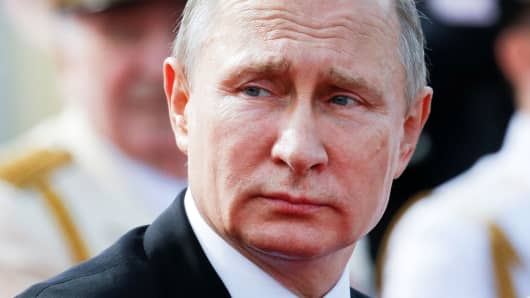By contrast, Friday's Washington Post report says U.S. intelligence has intercepted communications made by Russian businessman Yevgeniy Prigozhin claiming that he had permission from a Russian minister to move forward with a "fast and strong" action in early February. Another intelligence report says that on January 30, Prigozhin promised that he had a "good surprise" coming for Assad in between February 6 and 9.
If Prigozhin's name sounds familiar, it should. He's also one of the Russians indicted by special counsel Robert Mueller last week on charges of funding and organizing the online "troll farm" operations trying to influence voters in the 2016 U.S. election.
The real problem here is that Prigozhin hardly seems like a rogue actor in either case. His connections to Putin go back decades and they are close ties indeed. As a youth, Prigozhin did jail time and Russia experts say that's what's made him the man Putin often turns to for the "dirty jobs."
So far, the Pentagon is not publicly confirming these reports. The Kremlin is strongly denying its involvement in the Syria attack. But the evidence is strong and serious.
Now the question is: What can the U.S. do about it?
The best answer for now is to make staying in Syria even more costly and controversial than it already is for Moscow.
The first move has to include the State Department denouncing Russia's connections to this attack. It should threaten to pull out of the cooperative agreement the U.S. has with Russia that has allowed both nations' militaries to operate in Syria for several years now. It's true that doing so would create some new headaches for American commanders. But if Russian mercenaries are deliberately attacking Americans anyway, it's fair to say the cooperation agreement isn't worth much as it is.
Second, it's time to give Russia a little of its own medicine when it comes to asking its people to reconsider their political support for the Kremlin. Russian-sponsored conventional media and social media platforms routinely question America's presence in Syria.
President Donald Trump should ask the Russian people directly whether they continue to support Russia's involvement in Syria now that it's starting to cost Russian lives. Some of that has happened on its own. Family members of some of the Russian mercenaries killed in Syria are starting to publicly complain about the incident. The fact that the Russian people may not support this Syrian adventure is something Trump should bring up in talks with Putin and in the news media.
Putin rules Russia with an iron fist to be sure, but growing public anger over dead loved ones is something even dictators can't always control.
Finally, the carrot that can go along with the sticks mentioned above is an offer to provide Moscow sanctions relief for withdrawing these mercenaries from Syria.
The bottom line is that the U.S. cannot stand by and do nothing in response to this development. If we're going to indict and condemn Russians for election meddling that may or may not have had an impact, then there should be a proportionally stronger response to an armed attack on our soldiers.
If both the pro-Trump and resist-Trump movements can just calm down for a moment, they should start to notice that they both have the exact same enemy. In this case, it's not just the same country but the same individual person. If these acts of aggression against U.S. voters at home and troops overseas can't unite us, then perhaps nothing will.
Commentary by Jake Novak, CNBC.com senior columnist. Follow him on Twitter @jakejakeny.
For more insight from CNBC contributors, follow @CNBCopinion on Twitter.





